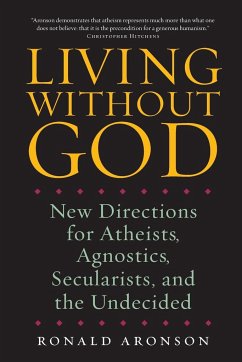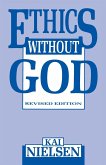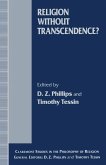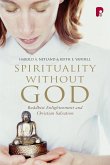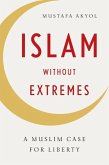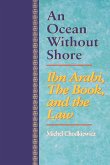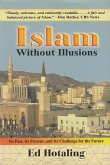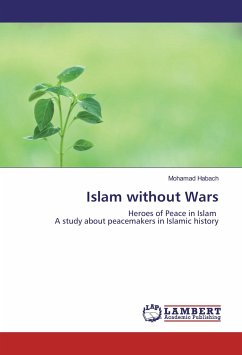Ronald Aronson
Living Without God
New Directions for Atheists, Agnostics, Secularists, and the Undecided
18,99 €
inkl. MwSt.
Versandfertig in 1-2 Wochen

9 °P sammeln
Ronald Aronson
Living Without God
New Directions for Atheists, Agnostics, Secularists, and the Undecided
- Broschiertes Buch
- Merkliste
- Auf die Merkliste
- Bewerten Bewerten
- Teilen
- Produkt teilen
- Produkterinnerung
- Produkterinnerung
Aronson has a mission: to demonstrate that a life without religion can be coherent, moral, and committed. Offering guidance for atheists, agnostics, secularists, and the undecided, "Living Without God" explores the experience and issues of 21st-century secularists.
Andere Kunden interessierten sich auch für
![Ethics Without God Ethics Without God]() Kai NielsenEthics Without God22,99 €
Kai NielsenEthics Without God22,99 €![Religion Without Transcendence? Religion Without Transcendence?]() Religion Without Transcendence?64,99 €
Religion Without Transcendence?64,99 €![Spirituality Without God Spirituality Without God]() Harold NetlandSpirituality Without God38,99 €
Harold NetlandSpirituality Without God38,99 €![Islam Without Extremes: A Muslim Case for Liberty Islam Without Extremes: A Muslim Case for Liberty]() Mustafa AkyolIslam Without Extremes: A Muslim Case for Liberty17,99 €
Mustafa AkyolIslam Without Extremes: A Muslim Case for Liberty17,99 €![An Ocean Without Shore An Ocean Without Shore]() Michel ChodkiewiczAn Ocean Without Shore38,99 €
Michel ChodkiewiczAn Ocean Without Shore38,99 €![Islam Without Illusions Islam Without Illusions]() Ed HotalingIslam Without Illusions18,99 €
Ed HotalingIslam Without Illusions18,99 €![Islam without Wars Islam without Wars]() Mohamad HabachIslam without Wars24,99 €
Mohamad HabachIslam without Wars24,99 €-
-
-
Aronson has a mission: to demonstrate that a life without religion can be coherent, moral, and committed. Offering guidance for atheists, agnostics, secularists, and the undecided, "Living Without God" explores the experience and issues of 21st-century secularists.
Hinweis: Dieser Artikel kann nur an eine deutsche Lieferadresse ausgeliefert werden.
Hinweis: Dieser Artikel kann nur an eine deutsche Lieferadresse ausgeliefert werden.
Produktdetails
- Produktdetails
- Verlag: Catapult
- Seitenzahl: 258
- Erscheinungstermin: 18. August 2009
- Englisch
- Abmessung: 229mm x 152mm x 15mm
- Gewicht: 424g
- ISBN-13: 9781582435305
- ISBN-10: 1582435308
- Artikelnr.: 26536090
- Herstellerkennzeichnung
- Books on Demand GmbH
- In de Tarpen 42
- 22848 Norderstedt
- info@bod.de
- 040 53433511
- Verlag: Catapult
- Seitenzahl: 258
- Erscheinungstermin: 18. August 2009
- Englisch
- Abmessung: 229mm x 152mm x 15mm
- Gewicht: 424g
- ISBN-13: 9781582435305
- ISBN-10: 1582435308
- Artikelnr.: 26536090
- Herstellerkennzeichnung
- Books on Demand GmbH
- In de Tarpen 42
- 22848 Norderstedt
- info@bod.de
- 040 53433511
Ronald Aronson grew up in Detroit and was educated at Wayne State, U.C.L.A., the University of Michigan, and Brandeis University, where he earned a Ph.D. in the History of Ideas. He studied with William Barrett, Page Smith, and Herbert Marcuse. Swept up in the political activism of the 1960s, he became a community organizer in the African American neighborhood of New Brunswick, New Jersey, and an editor of the prominent New Left journal, Studies on the Left. In spring, 1968, as he was completing a doctoral dissertation on "Art and Freedom in the Philosophy of Jean–Paul Sartre," he participated in the "Freedom School" organized in the aftermath of the student strike at Columbia University. Aronson has taught at Wayne State University since 1968, first at Monteith College, and from 1978 until 2008 in the (now–defunct) Department of Interdisciplinary Studies, a program for working adults. Author or editor of eight books, he is an internationally recognized authority on Jean–Paul Sartre. He has focused above all on the process of Sartre's transformation to a political thinker and activist. He has been Chair of the Sartre Society of North America and founding editor of the journal Sartre Studies International. With support by the National Endowment for the Humanities in 1980 he published Jean–Paul Sartre – Philosophy in the World (Verso); the American Council of Learned Societies supported research for his Sartre's Second Critique (University of Chicago Press, 1987). In 1983–4 he was Research Associate at University College London and in 1987 and again in 1990 he was guest lecturer at the University of Natal and other South African universities. The story of his first experience in South Africa, at the height of the struggle to end apartheid, is told in Stay Out of Politics: A Philosopher Views South Africa (Chicago, 1990). In recognition of his scholarly career and political contributions to South Africa, in April, 2002, he was awarded the honorary degree of Doctor of Laws by the University of Natal, Durban, South Africa. Winner of several scholarly and teaching awards at Wayne State, Aronson is a past president of its Academy of Scholars, the highest honor bestowed by faculty colleagues. In 2004 the WSU Board of Governors appointed Aronson Distinguished Professor of Humanities, as someone who "is recognized internationally as an author who joins social activism with the history of ideas." Aronson has produced televised political debates on democratic values and affirmative action (participants included Cornel West, Barbara Ehrenreich, Abigail Thernstrom, David Frum, and Dinesh D'Souza) and has published articles in Dissent, The Nation, The Yale Review, The Chronicle of Higher Education, The Washington Post, The Toronto Star, The International Herald–Tribune, The Times Literary Supplement (London, and The Times Higher Education Supplement (London). He is co–producer of the feature–length documentary film "Professional Revolutionary" about legendary Detroit social and political activist Saul Wellman and, most recently, 1st Amendment on Trial: The Case of the Detroit Six, focused on the Federal government's trial of Communist Party leaders in the '50s. One of his lifelong concerns has been to study and write about the nature of political commitment.
